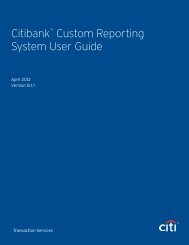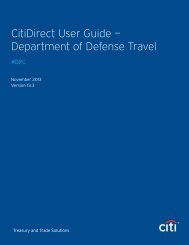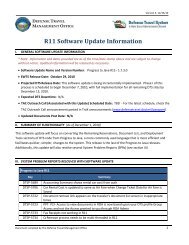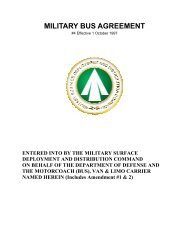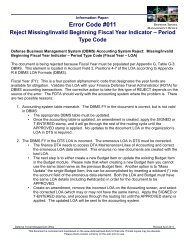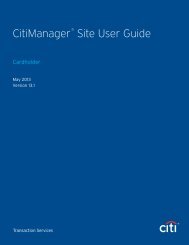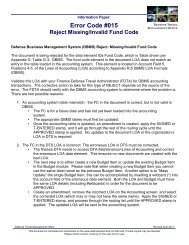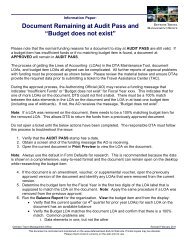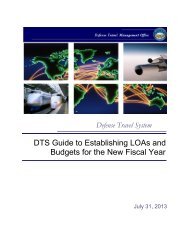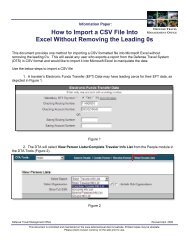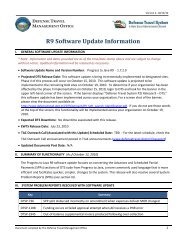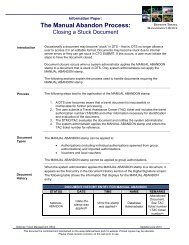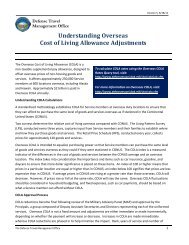Volume, V, Issue 1, Spring 2012 - DTMO
Volume, V, Issue 1, Spring 2012 - DTMO
Volume, V, Issue 1, Spring 2012 - DTMO
Create successful ePaper yourself
Turn your PDF publications into a flip-book with our unique Google optimized e-Paper software.
<strong>Issue</strong> 1 <strong>Spring</strong> <strong>2012</strong><br />
Defense Travel Dispatch<br />
Using<br />
Restricted<br />
Airfares<br />
Many DoD travelers frequently ask why they can’t<br />
use low airfares that they find on Internet travel<br />
sites. The truth is, under the right circumstances<br />
they can purchase lower-cost, restricted airfares<br />
for official travel – but DoD policy requires tickets<br />
for official travel be purchased through the<br />
contracted Commercial Travel Office (CTO). To do<br />
so, they must first get approval from their travel<br />
Authorizing Official (AO) and they must be sure<br />
that they don’t violate any of the rules related to<br />
the General Services Administration’s contract<br />
City-Pair Program. In addition, they need to weigh<br />
the savings against the potential additional costs<br />
related to changing or canceling a ticket.<br />
Under the rules for the city-pair program,<br />
travelers can purchase any ticket at a cost lower<br />
than the City-Pair fare if the fare is available to<br />
the general public. They cannot use a lower-cost<br />
fare that is limited to government travelers such<br />
as a discount government (DG) or category z<br />
(CATZ) fare. In addition, they must use a U.S. flag<br />
carrier, if available, and they can only fly on DoD<br />
approved airlines. Finally, if the airline that has<br />
the contract for the City-Pair also offers the same<br />
reduced fare, then the traveler must purchase the<br />
reduced fare ticket from that City-Pair carrier.<br />
The advantage with the City-Pair Program is that<br />
the tickets are unrestricted, which means they can<br />
be changed without any penalties and are fully<br />
refundable, if canceled. With restricted fare<br />
tickets, they are non-refundable, and the value of<br />
any canceled tickets can only be applied towards a<br />
new ticket purchased by the same traveler within<br />
the time frame established by the airline,<br />
generally with a hefty penalty. Whenever a<br />
traveler changes a restricted ticket, the traveler<br />
must pay a change fee in addition to any increase<br />
in the ticket based on what fares are available at<br />
the time the change is made. Therefore, the<br />
traveler and AO must consider how likely it is that<br />
the trip will not be changed or canceled, as well as<br />
what the likelihood is that the traveler will be able<br />
to re-use the ticket within the timeframe required<br />
by the airline if the trip is canceled. Travelers<br />
whose plans change frequently, or travel at the<br />
last minute, generally are not good candidates for<br />
restricted tickets.<br />
Each airline has different rules, change fees, and<br />
penalties, so the traveler and AO must read the<br />
particular airline’s fare rules carefully before<br />
deciding to purchase a restricted ticket.<br />
Purchasing a cheaper restricted ticket should be<br />
considered if a trip has very firm start and end<br />
dates, such as a conference, and the traveler is<br />
unlikely to be recalled home or elsewhere. If the<br />
cost difference between a restricted ticket and a<br />
City-Pair ticket is greater than any change fee,<br />
penalty, then the restricted ticket could be a good<br />
way to save government resources.<br />
8



